Early Years (EYFS)
EYFS Framework
The new statutory framework for the EYFS became effective on 1st Sept 2021.
Four guiding principles shape our practice. These are:
• Every child is a unique child, who is constantly learning and can be resilient, capable, confident and self-assured
• Children learn to be strong and independent through positive relationships
• Children learn and develop well in enabling environments with teaching and support from adults, who respond to their individual interests and needs and help them to build their learning over time. Children benefit from a strong partnership between practitioners and parents and/or carers.
• Importance of learning and development. Children develop and learn at different rates. This includes the education and care of all children, including children with special educational needs and disabilities (SEND).
Our focus initially is on settling in and the prime areas. These three areas are particularly important for building a foundation for igniting children’s curiosity and enthusiasm for learning, forming relationships, and thriving.
These are the prime areas:
• Communication and Language
• Physical Development
• Personal, Social and Emotional Development
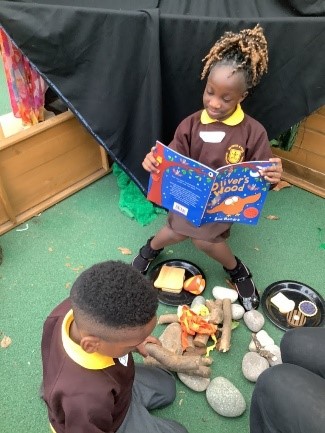
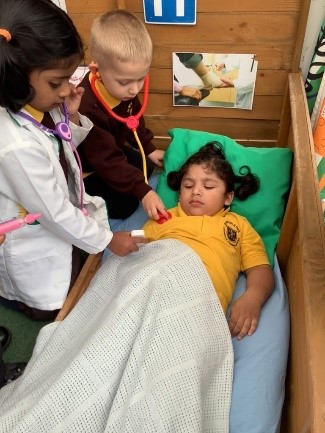
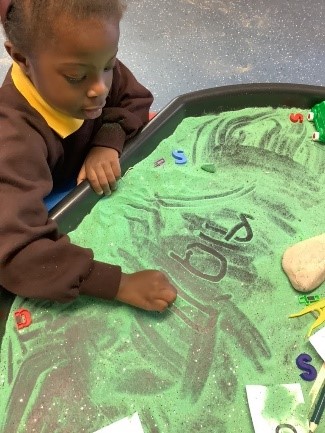
Communication and Language
The development of children’s spoken language underpins all learning and development. Children’s back-and-forth interactions from an early age form the foundations for language and cognitive development.
We ensure:
-plenty of quality of conversations between adults and children and peers throughout the day in a language-rich environment. Adults comment on what children are interested in or doing, and echo back what they say with new vocabulary added, in order to build children's language effectively.
-children are read to frequently, and engage actively in stories, non-fiction, rhymes and poems. They are provided with extensive opportunities to use and embed new words in a range of contexts. Through conversation, story-telling and role play, children share their ideas with support and modelling from adults, and sensitive questioning invites them to elaborate. Children become comfortable using a rich range of vocabulary and language structures.
Personal, Social and Emotional Development
Children’s personal, social and emotional development is crucial for children to lead healthy and happy lives, and is fundamental to their cognitive development.
Underpinning their personal development are the important attachments that shape their social world. Each child has been assigned a key person. Their role is to help ensure that every child’s care is tailored to meet their individual needs, to help the child become familiar with the setting, offer a settled relationship for the child and build a relationship with their parents.
We provide:
-strong, warm and supportive relationships with adults to enable children to learn how to understand their own feelings and those of others.
-support for children to manage emotions, develop a positive sense of self, set themselves simple goals, have confidence in their own abilities, to persist and wait for what they want and direct attention as necessary.
-adult modelling and guidance to learn how to look after their bodies, including healthy eating, and manage personal needs independently.
-supported interaction with other children so they learn how to make good friendships, co-operate and resolve conflicts peaceably. These attributes will provide a secure platform from which children can achieve at school and in later life.
Physical Development
Physical activity is vital in children’s all-round development, enabling them to pursue happy, healthy and active lives.
We provide:
-sensory, gross and fine motor experiences -opportunities for play both indoors and outdoors, where adults can support children to develop their core strength, stability, balance, spatial awareness, co-ordination and agility.
-repeated and varied opportunities to explore and play with small world activities, puzzles, arts and crafts and the practice of using small tools, with feedback and support from adults to allow children to develop proficiency, control and confidence.
Three characteristics of effective teaching and learning are:
• Playing and Exploring - children investigate and experience things, and ‘have a go’
• Active Learning - children concentrate and keep on trying if they encounter difficulties, and enjoy achievements
• Creating and Thinking Critically - children have and develop their own ideas, make links between ideas, and develop strategies for doing things
At SS Peter and Paul Catholic Primary School, we operate an EYFS Unit where Nursery and Reception age children learn alongside each other
Our Curriculum
All areas of learning are delivered through play both inside and outside. Hands on, practical experiences and purposeful play are fundamental vehicles for learning.
The role of an Early Years teacher is different to that of any other year group. Not only does an Early Years teacher deliver whole class inputs, work with small groups and individuals, they carefully plan and resource independent learning opportunities based on their knowledge of where the children are at, their interests and how to move them on.
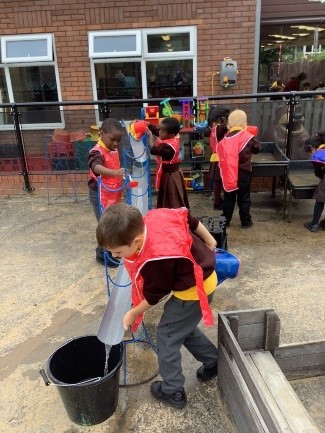
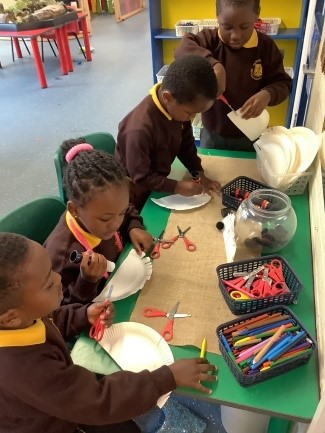
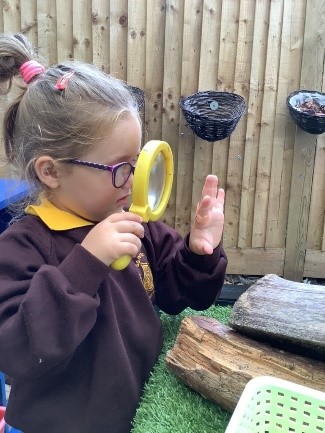
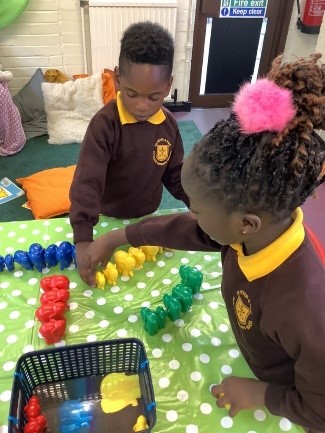
We have carefully planned EYFS topics; an overarching theme each half term. Nursery and Reception have a subtle (slightly different) focus. This allows for continuous provision to be planned holistically and for children to revisit and extend/ deepen knowledge and understanding, helping them embed concepts to long term memory. We balance this careful planned sequence with meeting the children’s needs and interests- flexibility is key.
| EYFS topic/ over-arching theme: | Focus for Nursery aged children: | Focus for Reception aged children: | |
| Autumn 1 |
Marvellous Me |
Me, my family, body parts, senses | My family and friends, people who help us |
| Autumn 2 |
Down in the Woods/ Christmas |
Bears | Woodland environment |
| Spring 1 | Terrific Toys |
Different types of toys/ how they work; puzzles and games, dolls, cars, diggers, lorries, trucks, dinosaurs, teddies, sports and balls. |
Old and new toys |
| Spring 2 | Traditional Tales | ‘Farmyard’ Traditional Tales | Traditional Tales |
| Summer 1 | Growing |
Lifecycles; butterflies |
Lifecycles; frogs and chicks/ ducks |
| Summer 2 |
Amazing Adventures Moving on/ Transitions |
Different types of transport |
Space; aliens, planets |
